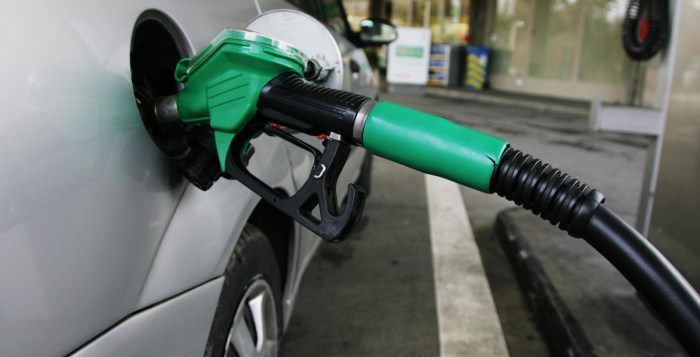Oil Marketers on Wednesday adjusted their pump price from N143 per liter to about N150 per liter.
The adjustments in oil price by the marketers followed the N138.62 ex-depot approved by the Petroleum Products Pricing Regulatory Agency as ex-depot price for a litre of petrol.
Advertisement
The PPPRA had raised the depot price from N132/N133 per litre by N6 per litre as a result of increase in the international price of the Brent Crude from $43.24 per barrel in July to $44.03 per barrel.
The PPPRA had in a memo on the new ex-depot prices of petroleum products, stated that the new price would take effect from August 5.
Findings by THE WHISTLER showed that many of the filling stations in the Federal Capital Territory have raised their pump price to between N149 per liter to N150 per liter.
The development caught most motorists unawares as they were not prepared for the price hike.
Advertisement
One of the motorists told this Newspaper that the rate at which the price of fuel is increasing has become too persistent within the last three months.
He said that at a time when Nigerians are struggling to survive the negative impact of Covid-19 pandemic on their finances, increasing the price of fuel would add more burden on the people.
He said, “The government should have pity on Nigerians by not adding more burden to our hardship.
“Three months ago, we bought fuel for about N124 per liter, last month, it was raised to N143 per liter and this morning, we are seeing a new price of N150 per liter.
“What this means is that the cost of living for us as Nigerians would definitely increase because fuel price affects so many things in this country.
Advertisement
“Transporters will use this opportunity of this upward adjustment to increase the price of transportation. The same goes to prices of goods and services.
“So we are pleading with government to do something to check this persistent increase in fuel price.”
Another motorist who gave his name as name as Peter said that the government should reintroduce fuel subsidy to cushion the impact of oil price volatility on the industry.
He said while fuel subsidy may not be the ultimate solution to the current challenges facing the petroleum industry, it could help to alleviate the suffering of Nigerians pending when the refineries would be fixed.
He said, “This increase in price is very shocking to me. I never expected it at this time. Government should not allow this to go on because the implications would be too grave for us at this time.”
The Minister of State for Petroleum Resources, Timipre Sylva, had said that the government was mindful of the likely impact higher PMS prices would have on Nigerians, adding that to alleviate this, the government was working very hard to roll out the auto-gas scheme.
Advertisement
This, he stated, would provide Nigerians with alternative sources of fuel and at a lower cost.
According to Sylva, when crude oil prices were down, government, through its regulatory functions ensured that the benefits of lower crude oil prices were enjoyed by Nigerians by ensuring that PMS price was lowered.
He added that at that time, the government indicated that increase in crude oil prices would also reflect at the pumps.
He blamed fuel subsidy for the low refining capacity in the country, noting that subsidy made it impossible to attract the much-needed investments into the refining sector.
He said, “This is a necessary action taken by a responsible government in the overall interest of Nigerians. Indeed, one of the reasons we have been unable to attract the level of investments we desire into the refining sector has been the burden of fuel subsidy.
“We need to free up that investment space so that what happened in the banking sector, aviation sector and other sectors can happen in the midstream and downstream oil sector.
“We can no longer avoid the inevitable and expect the impossible to continue. There was no time Government promised to reduce pump price and keep it permanently low.”



